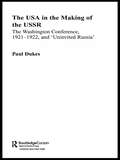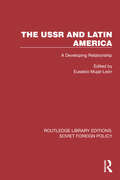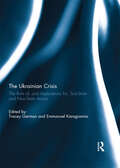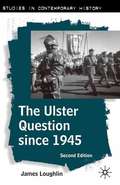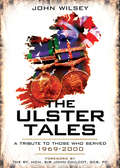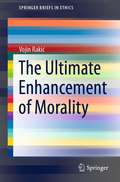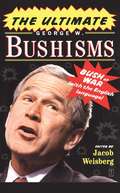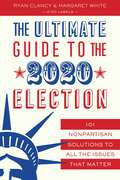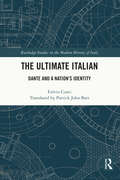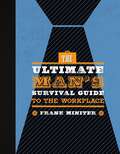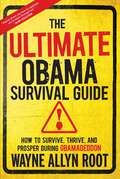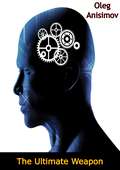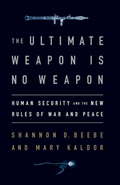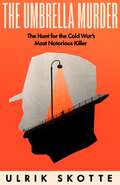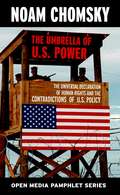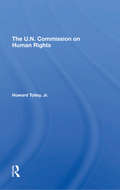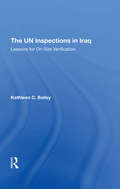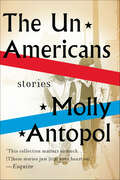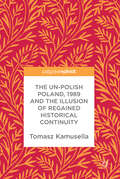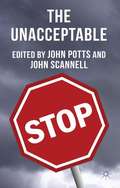- Table View
- List View
The USA in the Making of the USSR: The Washington Conference 1921-22 and 'Uninvited Russia' (Routledge Studies in the History of Russia and Eastern Europe)
by Paul DukesThe USA's contribution to the making of the USSR was accidental. In the belief that the Russian Socialist Federative Soviet Republic could not survive, American statesmen strove to keep the former Tsarist empire intact for a non-communist successor regime in the face of attempts by other powers to carve out spheres of influence in both European and Asiatic Russia. In this manner, they unwittingly facilitated the formation of the Union of Soviet Socialist Republics.This book shows the importance of the 'Russian question' at the Washington Conference and throws light on the emergence of the 'Versailles-Washington' system of international relations.
The USSR and Iraq: The Soviet Quest for Influence
by Bettie M. Smolanksy Oles M. SmolanskyIn The USSR and Iraq, the first major study of Soviet-Iraqi relations, Oles M. Smolansky examines the history of the relationship between these two countries during the past twenty years and attempts to dispel the misconception that the Soviet Union has enjoyed undue influence over Iraq.Drawing on ten years of research in Western, Arab, and Soviet sources, Smolansky analyzes the complex issues at the center of Soviet-Iraqi relations from 1968 through 1988, including the nationalization of the oil industry, the Kurdish question, the Iraqi Communist Party, the affairs of the Persian/Arabian Gulf, and, ultimately, the war between Iraq and Iran.Smolansky concludes that Iraq has never been under the dominant influence of Moscow, nor has it even been a loyal Soviet ally. In fact, Iraq has managed to reap major benefits from the relationship without losing its autonomy or sacrificing its major interests. The author discusses the Soviet Union and Iraq within the larger framework of the nature of influence relationships between great and small powers.
The USSR and Latin America: A Developing Relationship (Routledge Library Editions: Soviet Foreign Policy #25)
by Eusebio Mujal-LeónThe USSR and Latin America (1989) is an authoritative analysis of the Soviet Union’s strategy and policy towards the region. The contributors cover a variety of topics, including Latin America’s place in Soviet strategy for the developing world, US perceptions of Soviet strategy in the region, Soviet–Cuban relations, and relations between Latin American communist parties and the USSR.
The Ugly American
by William J. Lederer Eugene BurdickA novel that exposes the opportunism, incompetence and cynical deceit that have become imbedded in the fabric of our top-level diplomats.
The Ugly Princess and the Wise Fool
by Margaret GrayA quirky take on an every day fairy tale. Rose is not your typical princess, she isn't even beautiful. When her fairy godmother grants her one wish, her whole life changes.
The Ukrainian Crisis: The Role of, and Implications for, Sub-State and Non-State Actors
by Tracey German and Emmanuel KaragiannisThe conflict in eastern Ukraine continues with little sign of a negotiated resolution. Crimea has been absorbed into the Russian Federation, and celebrates the third anniversary of its ‘integration’ in March 2017. The ongoing nature of the conflict contrasts with a lack of academic exploration of the issues surrounding it. To date, most analyses have focused on the geopolitical implications of the Ukrainian crisis, such as the impact on NATO-Russia relations, and foreign policy responses to the crisis from a variety of state and supranational actors including the EU and Russia. The role of sub-state and non-state actors, and implications for them, has been largely overlooked.This volume seeks to rectify this by examining a wide array of non-state and sub-state actors that have both played a role in the conflict in Ukraine and been indirectly impacted by it.
The Ulster Question Since 1945: Second Edition (Studies In Contemporary History Ser.)
by James LoughlinThis major work of synthesis presents an up-to-date assessment of the issues at the very root of the troubles in Northern Ireland. Framed against the background of Ulster history since the early seventeenth century, the major factors in the development of the Ulster question since 1945 are examined. These include: - the evolution of Ulster Unionism and the Nationalist and Republican traditions - the role of Britain - the increasingly important part played by external actors, especially the USA Since the outbreak of the present troubles in August 1969, a thriving academic literature on Ulster and its history has emerged. Based on the most authoritative texts, this thoroughly revised and updated edition includes new materials on the period as a whole, and an assessment of the developments since the signing of the Good Friday Agreement in 1998.
The Ulster Tales: A Tribute to Those Who Served, 1969–2000
by John Wilsey&“Presents an insider&’s account of the experiences of ten Britons who were prominently involved in the Northern Ireland &‘troubles&’ between 1969 and 2000.&” —Perspectives on Terrorism The Ulster Tales captures the lives and experiences of ten individuals who were caught up in the Troubles. Each has a very distinct story to tell according to their role and position. Arranged roughly in chronological order, the book covers the media, military, intelligence, police, business, politics, and civil service. The first &“tale&” is that of Simon Hoggart, the journalist who reported for the Guardian newspaper in Belfast and London from the start. The military angle is covered by the GOC at a critical moment (General Sir Richard Lawson), a Private in The Green Howards from Barnsley, and a widow. A member of MI5 and a key Source Handler represent the Intelligence effort. The politician is Tom King who was Secretary of State at the time of the Anglo-Irish Agreement and narrowly avoided assassination, and we hear of the role of a top civil servant, Sir John Blelloch. &“The Policeman&’s Tale&” is that of a young Met officer who transferred to the RUC. The book is both a tribute to the many who dedicated their lives to the fight against terrorism and an original and interesting way of promoting a better understanding of the complex Northern Ireland situation.&“Sheds new light on a long and bloody military campaign. Each is moving and revealing, in varying degree, but all are uniformly absorbing.&” —The Times &“Veterans of the conflict will probably find the varied perspectives of policemen, businessmen, and civil servants a stimulating contrast to their own experience.&” —Terrorism and Political Violence
The Ultimate Enhancement of Morality (SpringerBriefs in Ethics)
by Vojin RakićThis book deals with good, evil, happiness and morally enhanced post-humans. It offers a succinct historical elaboration of philosophical stances towards morality and happiness, focusing on Kant's ideas in particular. Human augmented ethical maturity in a futuristic version of Kant’s Ethical Commonwealth implies, among else, voluntary moral bio-enhancement (VMBE); consequently, more happiness – as morality and happiness are in a circularly supportive relationship; ultimate morality (UM). UM is in its own way a universal morality. In line with the contention that Kant’s vision of the (not immediate but more distant) future of humanity is one of a cosmopolitan moral order in which humans act virtuously in the broadest possible community, that is, humanity, it is justified to conclude that successful VMBE is conducive to Kant’s vision. In this context the book is of great interest to a broad audience, such as those interested in VMBE and novel conceptions of morality, and those with an interest in the historical development of morality and happiness, in philosophy (specifically, ethics) and in post-humanity.
The Ultimate Field Guide to the U. S. Economy: A Compact and Irreverent Guide to Economic Life in America
by Nancy Folbre James HeintzUsing simple language, easy-to-read graphs and charts, and entertaining cartoons to illustrate key points, Heintz and Folber (U. of Massachusetts) answer common questions about different economic terms and trends while providing an up-to-date review of the U.S. economy. The first four chapters address major groups of people who affect and/or are affected by the economy in different ways. The next chapters cover particular areas of concern such as government, education and welfare, health, and environment. Finally, two chapters discuss the larger topics of macroeconomics and the global economy. Each individual page stands alone as a compact description of some fact or trend. Annotation c. Book News, Inc., Portland, OR (booknews.com)
The Ultimate George W. Bushisms: Bush at War (with the English Language)
by Jacob Weisberg"This business about graceful exit just simply has no realism to it at all." As the end of the Bush era approaches, the legacy is clear: George W. Bush is a wartime president. His enemy, battered but not defeated after repeated surges: the English language. The ultimate edition of George W. Bushisms captures this legacy -- from the Gulf Coast to Iraq and back -- with all-new pearls of wisdom and the twenty-five greatest hits of the entire presidency. "You know, when I campaigned here in 2000, I said, I want to be a war president. No president wants to be a war president, but I am one." "I think -- tide turning -- see, as I remember -- I was raised in the desert, but tides kind of -- it's easy to see a tide turn -- did I say those words?"
The Ultimate Guide to the 2020 Election: 101 Nonpartisan Solutions to All the Issues that Matter
by Margaret White No Labels Ryan ClancyWill Donald Trump&’s Mexican border wall actually make our country safer? How much will Bernie Sanders&’s Medicare for All plan really cost American taxpayers?You&’ll find the answers in this book. The 2020 US presidential election doesn&’t seem so much a battle of ideas as it does a war of two tribes bent on the other&’s destruction. The Far Left and Far Right increasingly dominate and drive America&’s political debate, leaving a majority of Americans feeling left out and left behind. The Ultimate Guide to the 2020 Election gives a voice to this majority and provides an unbiased education on the true nature of the problems America faces on several key issues, including: • Health Care • Energy & Climate Change • Infrastructure • Big Tech & Privacy • The American Dream • Immigration • The National Debt • Gun Safety Beyond these policy issues, No Labels senior advisors Ryan Clancy and Margaret White present ideas for rescuing American democracy itself. Complete with sample questions for the 2020 presidential candidates and an inclusive Unity Agenda that addresses concerns on both sides of the aisle, this nonpartisan political handbook should be required reading for all US voters.
The Ultimate Italian: Dante and a Nation’s Identity (Routledge Studies in the Modern History of Italy)
by Fulvio ContiThis book shows how Dante Alighieri has been represented in the Italian collective imagination from the late eighteenth century to the present day. Often held to be a precursor of Italian unity, the author of the Divine Comedy has been put forward both as a standard-bearer of a secular, anti-clerical Italy and the embodiment of the concept of a deeply religious and Catholic nation; while he was later adopted by nationalist and fascists as well as a pop icon in the age of the internet and globalization. The book describes this long and fascinating history from a completely original point of view: the centuries-old myth of Dante is analysed from the perspective of cultural history. The sources employed include Dante commemorations, festivals and monuments, pilgrimages to his tomb, films and other media productions about Dante, as well as comic strips, advertisements and other cultural items dedicated to him.
The Ultimate Life
by Jim StovallSequel to "the ultimate gift". Red Stevens, a billionaire, as a part of his last will & testament, left his very spoiled grandson, Jason, from whom he was estranged, what he called "the ultimate gift". There were 12 gifts, with tasks accompanying each. Jason completed each of these tasks & was awarded millions of dollars as a charitable trust in order to help people in need. But the rest of the Stevens family, in "The Ultimate Life", is contesting Red Stevens's will. In a winner-take-all court battle, Jason is required to prove, over the course of a year, again by performing 12 tasks, that he is indeed worthy to receive his grandfather's bequest. Jim Stovall is himself blind, & the book is peopled with many characters who have disabilities &/or are otherwise disadvantaged.
The Ultimate Man's Survival Guide to the Workplace
by Frank MiniterThe long overdue follow-up to Miniter's bestselling The Ultimate Man's Survival Guide: Rediscovering the Lost Art of Manhood, this hilarious and colorful guide to surviving the modern office is an absolute must for any man whose instincts are frequently leading him into saying and doing the absolute wrong thing in the workplace. And yes, we're talking about you.
The Ultimate Obama Survival Guide: How to Survive, Thrive, and Prosper During Obamageddon
by Wayne Allyn Root"DON'T GET MAD ABOUT OBAMAGEDDON...GET EVEN!"Build your wealth.Protect your faith and family.Secure your freedom. Don't just survive Obama...learn how to outsmart his big-government, socialist system and thrive!Bad times are coming -- how will you protect your family, save enough for retirement, and turn your home into a fortress?In The Ultimate Obama Survival Guide, Wayne Allyn Root provides the answer. First, he explains step by step what Obama has planned.Then, Root presents Y-PODS: Your Personal Obama Defense Shields - a detailed 18 point plan to protect your assets, capitalize, and PROSPER as the rest of the country treads water - or drowns! And that's just the beginning.Wayne Allyn Root is a passionate Capitalist Evangelist, serial entrepreneur, and small businessman extraordinaire. He knows what it takes to weather any economic storm. You're going to need Root's expertise as you and your family tackle the biggest challenge facing Americans today: Barack Obama's second term in the White House.Root takes you on a tour of the practical, real-life ways you can fight back and WIN, not just at the ballot box, but in your bank account, retirement account, safety deposit box, on your tax forms, at your church, in your home, your schools, and at your doctor's office.The Ultimate Obama Survival Guide also features exclusive advice from 18 superstars of business and finance - millionaires, billionaires, and managers of billion dollar hedge funds, who provide their specific plans for investing in precious metals, real estate, stocks, bonds, ETFs and more.What one investment decision made in 1913 turned $1,000,000 into $87,000,000?What investment decision outperformed Warren Buffet by 300% since 2000?What investment have central bankers around the world bought more of in the past year, than in all the years since 1964 COMBINED?Root provides the answers - along with detailed advice on the smart investments now, the best places to move to escape Obama's poisonous taxes, the best way to educate your children, survival advice on how to turn your home into a fortress, how to survive if the economy collapses and unrest threatens your family. If you are worried about what Obama has in store (and you should be) then arm yourself with Root's step-by-step instructions to protect yourself and your family RIGHT NOW from the Obama invasion of every aspect of your life.
The Ultimate Weapon
by Oleg Anisimov Gen. William J. DonovanIn The Ultimate Weapon, Oleg Anisimov attempts to define, within the framework of his personal experience in the Soviet Union, Germany, and Western Europe, "the profound revolution which has taken place in the political thinking of a continent exposed to totalitarianism, two devastating world wars, and the threat of a third within our lifetime."The book is concerned with psychological warfare. Efforts to turn soldiers and civilians in the enemy country against their rulers have been made by many a political leader since time immemorial, but what was new about political warfare [at the time of publishing this book in 1953] was its great scope and immense complexity. "Propaganda"--for this is what was regarded as political warfare in the last war--played a certain role in 1939-45. The Soviets, the Axis powers, and the Western Allies all used it as a means of influencing the people in the enemy camp, but it is very difficult to assess what effect it actually had in World War II.Mr. Anisimov's book is the first serious attempt to offer a new approach to this complex problem of political warfare. He does not presume to present any quick formula for the solution of the formidable difficulties that face the United States in its struggle against the Kremlin, but rather faces the problem squarely, and suggests a method of tackling it that deserves serious attention.
The Ultimate Weapon is No Weapon: Human Security and the New Rules of War and Peace
by Mary H. Kaldor Shannon D. BeebeThe twenty-first century has seen millions unemployed. It has seen livelihoods undermined by environmental degradation. Middle-class cities in Europe, Asia, and Africa have become cauldrons of violence and resentment. Tribalism, ethnic nationalism, and religious fundamentalism have flared dangerously, from Russia to Spain. The use of force is unlikely to help. What works when counter-insurgency has run its course: in Iraq, Afghanistan, Pakistan, and beyond? In this book, two authors brought together from distant points on the political spectrum by their concerns about the repercussions of violent political conflict on human lives, explain and explore a new idea for stabilizing the dangerous neighborhoods of the world. They challenge head-on Condoleezza Rice’s declaration that "it is not the job of the 82nd Airborne Division to escort kids to kindergarten” contending that, in fact, it should be. When marginalized populations are trapped in poverty and lawlessness and denied political power and justice brutality, and fascism thrive. Human security is a new concept for clarifying what peace requires and the policies and priorities by which to achieve it.
The Umbrella Murder: The Hunt for the Cold War's Most Notorious Killer
by Ulrik Skotte'This masterly investigation, spanning 30 years, into the assassination of a cold war dissident, Georgi Markov, in London in 1978 exposes an assassin worthy of James Bond' -Observer, Book of the WeekLondon, September 1978: exiled Bulgarian dissident Georgi Markov is murdered in broad daylight on Waterloo Bridge with what appears to be a poison-tipped umbrella. It would become the most infamous unsolved killing of the Cold War.Many years later, young journalist Ulrik Skotte is approached with explosive new information about a man alleged to be responsible for Markov’s death – a spy code-named Piccadilly who worked for the Bulgarian secret service. This meeting launched Skotte into a hunt for the killer lasting more than a quarter of a century, bringing him face to face with eccentric conspiracy theorists, a washed-up former dictator, ageing Danish spooks – and, ultimately, with Agent Piccadilly himself.Drawing on an incredible cache of original documents, interviews and archive material, The Umbrella Murder provides jaw-dropping answers to questions that have persisted for nearly five decades: who killed Georgi Markov? And who has been protecting the assassin ever since?
The Umbrella of U.S. Power: The Universal Declaration of Human Rights and the Contradictions of U.S. Policy (Open Media Series)
by Noam ChomskyChomsky observes the 50th anniversary of the Universal Declaration of Human Rights as a "Path to a Better World," while chronicling how far off the trail the United States is with respect to actual political practice and conduct. Analysing the contradictions of U.S. power while illustrating the real progress won by sustained popular struggle, Chomsky cuts through official political rhetoric to examine how the United States not only violates the UD, but at times uses it as a weapon to wield against designated enemies.
The Un Commission On Human Rights
by Howard Tolley JrIn 1946, the United Nations Commission on Human Rights became the first international body empowered to promote global human rights. During its first twenty years, the Commission established most of the contemporary standards of human rights. Increased social awareness in the 1960s enabled the Commission to respond to specific complaints from individuals and nongovernmental organizations and to pressure offending governments by using various measures that ranged from exhortation and mediation to sanctions designed to isolate violators. These enforcement activities have increased the Commission's visibility and have dramatically transformed its operation. Dr. Tolley's thematic history of the Commission offers important insights into states' political conduct in international human rights organizations, the evolving legal and institutional means of preventing human rights violations, and the difficulties encountered when an intergovernmental body is pressed to provide impartial protection to citizens against abuse by their own government.
The Un Inspections In Iraq: Lessons For On-site Verification
by Kathleen C BaileyThis book describes the problems encountered by UN inspection teams assigned to find and destroy Iraq’s nuclear, chemical, biological, and missile capabilities following Desert Storm. Kathleen C. Bailey focuses on the initial inspections—the period in which Iraq was struggling to camouflage and conceal its weapons and production equipment as inspectors were trying to define their role in the process. Working from interviews with these initial inspectors, Bailey extracts important lessons for future verification efforts. On-site arms control inspectors in Iraq found information to be carefully controlled by the government. Pertinent documentation was destroyed, only selected people were allowed to interact with inspectors, and officials refused to make full, complete declarations. Buildings were tom down, equipment was moved, and un-exploded ordnance was placed in the way. These and other techniques helped Iraq to hide its past activities and to preserve some of its weapons capabilities. In the future, arms control inspectors will need to develop strategies for dealing more effectively with recalcitrant inspectees and for creating the best possible procedures and processes. Bailey concludes with concrete suggestions for overcoming some of these obstacles with more effective inspection practices.
The Un-Americans: Stories
by Molly AntopolA stunning exploration of characters shaped by the forces of history, the debut work of fiction by a National Book Foundation "5 Under 35" Honoree.Moving from modern-day Jerusalem to McCarthy-era Los Angeles to communist Prague and back again, The UnAmericans is a stunning exploration of characters shaped by the forces of history. Molly Antopol’s critically acclaimed debut will long be remembered for its "poise and gravity" (New York Times), each story "so full of heartache and humor, love and life…[it’s] as though we’re absorbing a novel’s worth of insight" (Jesmyn Ward, Salon).
The Un-Polish Poland, 1989 and the Illusion of Regained Historical Continuity
by Tomasz KamusellaThis book discusses historical continuities and discontinuities between the Polish-Lithuanian Commonwealth, interwar Poland, the Polish People's Republic, and contemporary Poland. The year 1989 is seen as a clear point-break that allowed the Poles and their country to regain a 'natural historical continuity' with the 'Second Republic,' as interwar Poland is commonly referred to in the current Polish national master narrative. In this pattern of thinking about the past, Poland-Lithuania (nowadays roughly coterminous with Belarus, Latvia, Lithuania, Poland, Russia's Kaliningrad Region and Ukraine) is seen as the 'First Republic. ' However, in spite of this 'politics of memory' (Geschichtspolitik) - regarding its borders, institutions, law, language, or ethnic and social makeup - present-day Poland, in reality, is the direct successor to and the continuation of communist Poland. Ironically, today's Poland is very different, in all the aforementioned aspects, from the First and Second Republics. Hence, contemporary Poland is quite un-Polish, indeed, from the perspective of Polishness defined as a historical (that is, legal, social, cultural, ethnic and political) continuity of Poland-Lithuania and interwar Poland.
The Unacceptable
by John Potts John ScannellConfronting the issue of the unacceptable as a social category, this collection of international essays provides distinctive perspectives on the theme of what is deemed socially acceptable. The book reveals the ways category of the unacceptable reflects sexual, racial and political fault-lines of a society.
